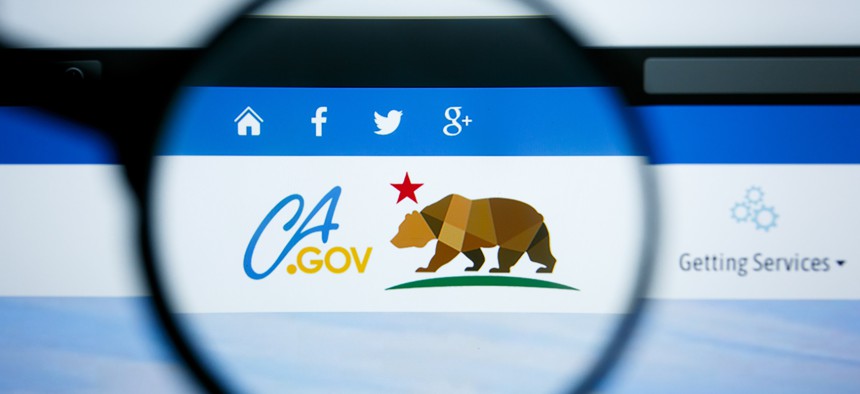Federal Lawmakers Push '.Gov' Web Addresses For Local Governments

Shutterstock
A new U.S. Senate bill comes amid concerns that online criminals can “spoof” the public with fake government websites.
Federal agencies and states tend to have website addresses that end in “.gov,” a signal to users that they’re clicking on official sources of government information.
But across local governments, domain names are more of a mixed bag and might end in “.com,” “.org,” or “.us.” While this may seem trivial, experts say it opens the door for “spoofing,” where criminals post imposter websites that can trick the public in a variety of ways.
Look-alike department of motor vehicle sites, where people can get scammed out of cash, or have personal information stolen, and artificial elections websites that might direct people to the wrong polling place, are just two potential examples.
“Anyone can get on a .com, .us, and we’ve seen a lot of instances of spoofing,” said Matt Pincus, director of government affairs for the National Association of State Chief Information Officers. “From a citizen perspective, not being on .gov is really creating confusion.”
With this as the backdrop, a bipartisan group of lawmakers in the U.S. Senate is supporting a bill aimed at increasing the number of local governments with .gov web addresses.
The “DOTGOV Online Trust in Government Act,” introduced last week, directs the Cybersecurity and Infrastructure Security Agency, or CISA, within the Department of Homeland Security, to take new steps to help counties, cities and other jurisdictions transition to the .gov domain.
Projects to shift local government websites over to .gov URLs would become eligible under the bill for funding through the federal Homeland Security Grant Program. Federal authorities would also have the option to provide .gov-related services to state and local government entities without reimbursement.
The bill would give CISA’s director new responsibility over the federal government’s DotGov Program. Currently run by the U.S. General Services Administration, the initiative offers .gov web addresses to government organizations throughout the country.
Government entities have to follow specific guidelines to get a domain name through the federal program, and have to pay a $400 annual fee for their .gov web addresses.
Pincus said that the price to get one of the web addresses can be cost prohibitive for many smaller jurisdictions, especially when all of the benefits are not clear to them, and there are .com or .us alternatives available that are less expensive.
But there are perks he suggested the federal government could highlight in trying to get more local governments onboard with the DotGov Program, like “monitoring tools,” a 24/7 help desk, automated updates and data backups. “Those are very important things,” he said.
Barb Byrum is the county clerk in Ingham County, Michigan, a jurisdiction with about 290,000 residents in the Lansing area. The county’s main website can be found at “ingham.org.”
The decision to go with the .org URL was made before Byrum, or the county’s current IT director started in their positions. “I don't know why it is .org as opposed to .gov,” Byrum said.
Byrum said she’s spoken to the IT director about changing over to a .gov URL, but the county hasn’t moved ahead to do it yet. “In an era where we are seeing a lot of disinformation and misinformation,” she said, “I do think it would be extraordinarily helpful.”
“I think the benefit would certainly outweigh the cost,” Byrum added.
The Senate bill specifically calls for CISA’s director to come up with an outreach strategy to inform and support local, tribal and territorial governments in making the .gov switch. It would also require the director to develop an online reference guide for that transition.
Additionally, there’s a provision that would direct CISA to submit a “security enhancement plan” to Congress, outlining how the agency plans to improve cybersecurity protections embedded in the DotGov Program over the course of five years.
U.S. Sen. Gary Peters, a Michigan Democrat who is the ranking member on the Senate Homeland Security and Governmental Affairs Committee, is the lead sponsor of the bill.
The committee's chairman, Sen. Ron Johnson, a Wisconsin Republican is a co-sponsor, along with Sens. Amy Klobuchar, a Minnesota Democrat, and James Lankford, an Oklahoma Republican.
Ron Bushar, vice president of government services with the cybersecurity firm FireEye, noted that there could be future opportunities for the federal government to target additional layers of cybersecurity protections to all .gov websites.
That could provide enhanced security from various online threats for even small local governments.
Many of the highest profile cybersecurity incidents for local governments in recent months have involved places that fell victim to so-called “ransomware” attacks, where criminals lock up data or computer systems and demand a payment for them to be released.
Bushar said it’s unlikely that the DotGov Program would do much in the near term to cut down on these attacks. That’s because they typically involve “phishing” schemes where government employees click on malicious links in emails or on infected websites.
“I couldn’t honestly tell you it would have a major impact on ransomware issues right now,” he said. “I would call it a common sense implementation that’s not going to change the game,” Bushar added. “But it certainly would have benefits.”
Bill Lucia is a Senior Reporter for Route Fifty and is based in Olympia, Washington.
NEXT STORY: A Plan to Engage Hackers in Election Security






